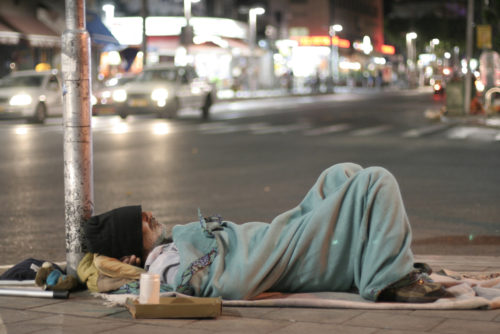Homelessness is a serious problem in America. People are living on the streets, without a secure place to lay their head down at night, and it’s a hard problem to solve.
The first barrier to solving homelessness in America is getting a firm number of how many people are currently homeless. Studies have numbers ranging from 1.56 million people being homeless long term to 3.5 million having to use emergency housing at least once a year.
It’s estimated that 2.5 million children will experience homelessness in some form or another each year. That’s around 1 in every 50 U.S. children who will either have a single night of homelessness or a long stretch of time without a home. Many of these children are runaways from parents, guardians, foster families, or unsafe environments.
Homelessness isn’t just sleeping on the street or spending each night at a shelter; there are others who live perpetually in hotels, temporary housing solutions, or stay in homes they don’t own.
Table of Contents
How Do People Become Homeless? The Top Causes of Homelessness in the USA
There are different reasons for homelessness, but nearly all of them stem from issues surrounding money. Either the person has no money, doesn’t earn enough money to afford housing, or loses their housing because they can’t make regular payments.
Money isn’t the only reason, though. Other factors can lead to becoming homeless, like getting kicked out of your home, running away from a dangerous environment, or having your home destroyed.
Poverty
It makes sense that if you have no money, you can’t afford to pay for a place to live. Many people, who either can’t find a job or whose job (or combinations of jobs) don’t pay enough, live in a situation where they can’t pay hundreds or thousands of dollars for a place to stay.
Some, though, do have a job, but because of other expenses, such as medical bills, crippling debt, or a financial crisis, can’t afford to pay for housing. In some cities, housing is so expensive that those who can only get low/minimum wage jobs can’t afford a place to stay.
Unemployment and Job Loss
Losing your job, or going a long period without a job, can be a major contributing factor to becoming homeless. Even if you have savings enough to cover your rent for a while, many apartments or landlords won’t rent to somebody without proof of employment. Many people can claim unemployment after losing a job, but after a certain time, those benefits run out.
Emergencies or Personal Crises
Alongside nearly every emergency, crisis, or major life change comes a pretty big bill. This can include medical bills, a car breaking down, losing a loved one, or anything else that could put you in the way of a personal crisis. When it comes to dealing with massive debts you aren’t prepared for, losing your home is a pretty common result.
Other emergencies might require time to solve, which could result in not bringing in a paycheck, or losing a job completely.
Lack of Affordable Housing
The United States clearly has a housing problems, with some states asking for ridiculous prices for even the most basic of living situations. Many major cities in the U.S. have studio apartments charging over a thousand dollars a month in rent.
Even people with full time jobs sometimes can’t afford a place to live in cities with higher cost of living. This might mean staying in a temporary solution, like a hotel, or simply survive living out of a car or literally on the streets.
Physical and Mental Health
Sometimes, our health can get in the way of being able to earn an income. Disabilities, drug addiction, mental illnesses, and more can be major barriers to having a job. Sometimes, people with long term disabilities can survive by utilizing social security and Medicaid, but not always.
Disabilities also mean higher medical bills and insurance rates, extra expenses that have to be paid alongside other costs of living. This might mean not enough to pay for a place to stay.
Family Issues
Things like divorce, domestic abuse, the death of a household’s main earner, or needing to care for a hurt or disabled family member can all contribute to become homeless. Family issues not only contribute to adults becoming homeless, but children too. Many flee when forced to confront their parents about something, especially about their gender or sexuality. Research shows that a large number of runaway youth are LGBT and fleeing hostile home environments.
Natural Disasters
If your home is destroyed in a fire, earthquake, tornado, tsunami, volcanic eruption, or any other natural disaster, you are consequently homeless. There is no place to call home, or if there is, it’s in such a terrible state that it’s unsafe to live in.
After a major natural disaster, there are some people who never fully recover financially from the loss of their home. Often, they are forced to relocated to a new town or city and start over from scratch.
Identity and Demographics
Your race, gender, sexual orientation, and identity as a whole can play a role in your housing situation. Discrimination and abuse are more common for many marginalized groups, both in public and in their homes. They are more likely to run away from home or be forbidden from living at home as children. At all ages, minorities of all varieties have a hard time finding housing and are more likely to become homeless, both at a single point in time and for long stretches of life. Minorities also have a harder time gaining employment, another factor contributing to homelessness.
Lack of a Support Network
Many people have a fall back plan if they do lose their home. They can stay with family, friends, a coworker, or somebody else within their support network. For some, that isn’t an option. Either they don’t have a support network, or they’ve exhausted their options without managing to find a permanent solution to their housing or underlying challenges.
Homelessness is a serious problem, both in the United States and around the world. Often, it’s not just one reason that contributes to becoming homeless, it’s multiple factors. Most times, those that are homeless are just having really bad luck, or a string of misfortunes. Try to help out where you can, including volunteering at shelters or soup kitchens, making donations to homeless charities, or advocate for their rights.
Image Source: https://depositphotos.com/





